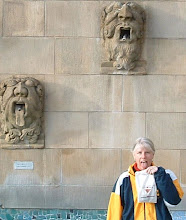As a graduate student I am writing this blog and experiencing Second Life as the result of the class taught by Dr. Jennifer Stone called "Digital Literacies."
There are a variety of literacies on the internet that allow for the search of identity. Because of the amount of time people are spending on the internet, these literacies are being used as discourses in the shaping of identity. I am interested in what I call "recognition moments," those times when I consciously am aware that I have learned something or moved from one level of knowledge or mastery to the next. Within the context of Second Life I anticipated that there is the potential for informal and formal “identity shifts” or personal "moments of recognition" within this type of literacy. I looked for those recognition moments, either formal or informal, as my avatar moved from creation through learning to interacting with other avatars within Second Life. Because creating and using an avatar causes actions that are more observable than interactions in my First Life, this seemed to be an ideal method to look at how recognition moments happen and how I react to them.
What I have been most surprised about is how closely Second Life (SL) is structured to First Life (FL). This makes sense, considering the fact that SL was created by people to allow people to create, in virtual space, that which they want to have in FL but may or may not be able to own or produce. Within this structure so many of the FL social constructs have stayed. Appearance doesn't seem to matter, but most avatars I've seen are all thin and, in their own terms, beautiful. Ugly and overweight does not seem to exist in SL or at least where I've been (I've not been everywhere). The variety of research on the topic of avatars and how they reflect their creators point out that avatars are normally better looking than the original models and that this is reflected in how they act as well.
I was also surprised that recognition of learning success was automatically programmed into SL at the beginning. Once you are "off the island" (help island) then you are mostly on your own, although you can find people from Linden Labs to help or go to the help portion of the website for anything.
Once I worked my way off the island, the recognition moments have been few and far between. I've mostly been frustrated with knowing how to move my body when interacting as well as where to go to find people who share interests. But, like FL, that all takes time and is happening. I'm waiting now for the next recognition moment - and I don't know what that might be, since this is much like FL and I don't know at any given moment if that will be a recognition moment for me or not. It appears that recognition moments can (at this point in my research) be separated into three types: within the construct of the system (for example what Linden Labs has programmed into SL), external recognition from other avatars, and internal recognition by me personally. As I continue to research recognition moments it will be interesting to see if they sort into more categories as well as which categories have the most recognition moments.
In terms of educational uses there are many things about SL that could be utilized. SL has thought of most of them, since they do have a Teens SL for the under 18 set and there is an Educational SL section for both under 18 classes as well as the potential for universities to purchase land and build in SL. You can have a secure place to learn, build learning spaces, manipulatives, and, in the process, help students of all ages understand who they are and what their recognition moments are - whether internal or externally acknowledged. The potential is there to help learners understand the time and effort required to master new learning, including new discourses and how SL is rife with interextuality. To see what one digital literacies professor is doing with SL and how they are blogging professionally with this (as an auto-ethnography, as is this), please see Angela A. Thomas' blog. It is the best professional blog covering digital literacies that I've found, although my search is not exhaustive. She is doing much of what I'd like to try out in SL, although with a different focus. She teaches in SL, attends and presents at conferences, and is working through all this as an auto-ethnographer, but could include research with other subjects as well.
Another site to visit if you are an educator is called VLearn 3D. The site searches for educators who are engaged in digital literacies and provide a space in which sharing, encouragement, and interaction may happen to help everyone with education in virtual spaces. They are engaged in everything from helping educators and students work in virutal worlds/classrooms/etc., to assisting in grant writing for educators wanting or working in virtual environments.
One of the groups we studied in our class was the New Media Consortium. They have been busy in SL, holding a conference on creativity in August 2007.
http://www.youtube.com/watch?v=9hek6G7GZ80
I will continue to blog about all kinds of things (since that is the title of the blog). While I will spend time in SL, it has taught me that my FL is more important to me than SL and that recognition moments are everywhere if we are aware.
